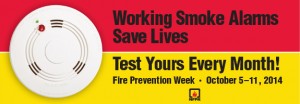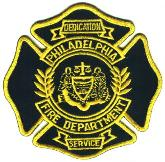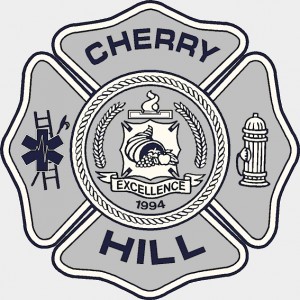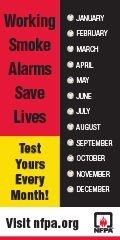And it kicks off a whole month of Fire Prevention awareness!

Fire Prevention Week occurs every year in October during the week in which October 9th falls. The choice of this week during the year commemorates the Great Chicago Fire of 1871. And, this year’s fire prevention week theme is “Working Smoke Alarms Save Lives: Test Yours Every Month!”
So what’s the big deal about smoke alarms?
While almost all U.S. homes have at least one smoke alarm, three out of every five home fire deaths resulted from fires in homes with no smoke alarms or none that worked. Most fatal fires occur when people are asleep. As you might expect, the number of deaths from home fires increases for folks under the influence of alcohol, drugs or medications, or who have disabilities or are deaf, because they aren’t able to act on the smoke alarm’s warning.
For this reason, there are special smoke alarms available for the deaf and hard of hearing. Click on the link below to connect to these valuable resources:
Alarm Guide For The Deaf and Hearing Impaired
Nuisance alarms (you know, that annoying chirp that usually means you need to replace the battery, or that you need to replace the alarm) are the leading reason for disabling smoke alarms. (Source: NFPA’s Fire Analysis and Research Division. May 2014 Request references by e-mailing [email protected])
Smoke Alarms and the National Scene:
• Almost three of five (60%) reported home fire deaths in 2007 to 2011 resulted from fires in homes with no smoke alarms or no working smoke alarms.
• Working smoke alarms double you and your family’s chance of surviving a house fire.
• In fires considered large enough to activate the smoke alarm, hardwired alarms operated 93% of the time, while battery-powered alarms operated only 79% of the time.
• When smoke alarms fail to operate, it’s usually because the batteries are missing, disconnected, or dead.
Closer to Home:

Congratulations Philadelphia, PA!
The Philadelphia Fire Department made history in 2013, with the lowest recorded fire fatality rate for the third year in a row!
The Philadelphia Fire Department has been working year after year to achieve their goal of *zero* fire fatalities – and they’re getting closer to their goal:
In 2013, there were a total of twenty-four (24) fire fatalities – the lowest number of fire fatalities in Philadelphia’s recorded history – and, a drop of 4% from the previous year.
Of the twenty-four deaths from fire, eleven occurred in properties that did not have smoke alarms, or had smoke alarms with inoperable or missing batteries.
(Source: http://media.nbcphiladelphia.com/documents/Philly+Fire+Dept+Year+End+Report.pdf)
Fires happen – especially in urban communities. The property damage from fires, while difficult, can always be restored. But, lives lost to fires are gone forever.
Knowing that smoke alarms save lives, the Philadelphia Fire Department instituted a program in 2010 for families in the city who may not be able to afford the purchase of smoke alarms.
If you, or someone you love in the City of Philadelphia needs help obtaining working smoke alarms, contact the Philadelphia Fire Department’s smoke alarm hotline at (215) 686-1176

And in Cherry Hill, NJ, fire prevention awareness is an everyday practice!
Did you know that:
• The New Jersey Fire Code requires that every home has a working smoke alarm installed on each level of the home – except the attic.
• The Cherry Hill Fire Prevention Ordinance requires smoke alarms to be installed in every bedroom.
• Smoke alarms should be replaced every 10 years
• Smoke alarms should be tested monthly, following the manufacturer’s instructions
• All smoke alarms should be UL-217 approved, the “UL Listed” rating clearly on the alarm and box
• Ionization smoke alarms are more responsive to flaming fires and photoelectric smoke alarms are more responsive to smoldering fires.
Therefore, for the best protection, and when extra time is needed, to awaken or assist others, both types of alarms, or combination ionization and photoelectric alarms are recommended.
And did you also know that
• When selling your home in Cherry Hill, NJ smoke alarm *and* carbon monoxide alarm inspections by the Fire Marshal’s Office are required prior to the settlement date?
If you live in Cherry Hill, NJ and can’t afford a smoke alarm, the Fire Department in Cherry Hill can provide one to you free of charge. If you live in Cherry Hill, you can contact the Fire Marshal’s office on the web here: http://nj-cherryhill.civicplus.com/index.aspx?NID=632 or by calling their office at (856) 429-7441.
*** If you’re not lucky enough to live in the City of Philadelphia or in Cherry Hill Township and need assistance with obtaining a smoke alarm for your home, contact the township municipal office in which you live. ***

So here are the
Do’s and Don’t’s for Smoke Alarm Installation:
• DO Mount the smoke alarm on the ceiling or high on a wall in every bedroom and on every level of your home
• DON’T MOUNT within four (4″) inches of the corner of the ceiling (not enough air circulates to activate the alarm in the event of fire).
• DON’T INSTALL near vents, ceiling fans, windows or doors (drafts may keep the alarm from working properly).
• DON’T INSTALL in the kitchen, garage, attic, near a bathroom, or other unheated spaces (cooking, exhaust fumes, temperature differences and steam can cause false alarms). [/one_half_last]

Pingback: The 12 Days of Holiday Fire Safety Tips | PuroClean Emergency Recovery Services